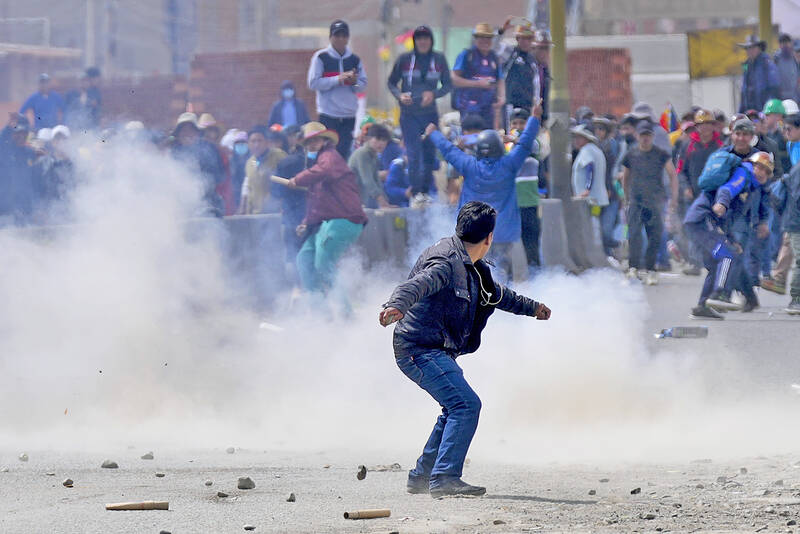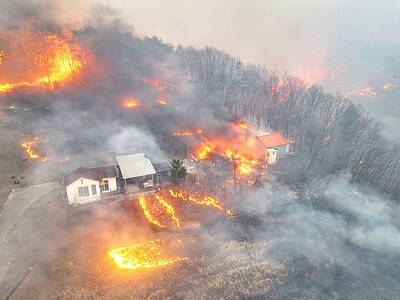Pro-government supporters and security forces on Sunday confronted protesters loyal to former Bolivian president Evo Morales in a street melee, the second such violent escalation in a week as fears grew of further unrest in the Andean nation.
The protesters and counterprotesters hurled firecrackers, homemade explosives and stones at each other across a dusty sprawl in the city of El Alto, while riot police unleashed tear gas into the crowds. At least eight people were injured, the Bolivian Ministry of Health said.
The standoff — which erupted while thousands of Bolivians supporting Morales continued a week-long 190km march to the capital, La Paz — spoke to the depth of the schism in Bolivian politics ahead of next year’s presidential election.

Photo: AP
Morales and his former economy minister-turned-bitter-rival, Bolivian President Luis Arce, are vying to lead Bolivia’s long-dominant socialist party, MAS, into next year’s vote. Their power struggle has paralyzed the government, exacerbated the depletion of Bolivia’s foreign exchange reserves and fueled street protests.
The rolling political crisis began in 2019, when Morales — who came to power in 2006 — was forced to resign after being re-elected to a third term in a vote marred by accusations of fraud and mass protests. He left the nation, but made a dramatic political comeback a year later, returning to find he had retained widespread support among poor and indigenous Bolivians.
Mobilized by Morales, bound together by misery over Bolivia’s economic meltdown and outraged by Arce’s efforts to block the candidacy of their polarizing former leader, the marchers on Sunday stopped on their sixth day of walking to sleep at an encampment 11km from El Alto, a sprawling city on a plateau above Bolivia’s capital.
Seeking to portray the march as a reflection of Bolivia’s indigenous highland culture as much as a political exercise, Morales — surrounded by supporters waving the multicolored flag dear to indigenous Andeans that the leftist leader turned into a patriotic symbol when he served as the nation’s first indigenous president — praised his supporters’ “peace and enthusiasm.”
Other Morales supporters broke off from the march and pressed into the scrappy outskirts of El Alto, where security forces and supporters of Arce had massed in anticipation of their arrival. The protesters and counterprotesters clashed in the neighborhood of Ventilla as acrid smoke from burning tires and thick clouds of tear gas coursed through the streets.
Each side blamed the other for the violence.
Morales accused Arce’s government of deploying “paramilitary groups to incite violence,” busing officers into El Alto to stir up trouble — a claim echoed by Bolivia’s ombudsman.
“It’s very sad that this government doesn’t pay attention to its conscience,” said Benita Cruz, a Morales supporter at the scene of the clashes. “They are repressing the poor and most humble people.”
In increasingly dramatic terms, Arce — who earlier this year faced what he described as a military coup attempt — has accused Morales of seeking to sabotage his government.
The unrest offered a possible preview for the coming days, as Morales and his thousands of supporters have promised to continue their so-called “March to Save Bolivia” into La Paz, despite vows by Arce’s supporters to prevent them.

DEATH CONSTANTLY LOOMING: Decades of detention took a major toll on Iwao Hakamada’s mental health, his lawyers describing him as ‘living in a world of fantasy’ A Japanese man wrongly convicted of murder who was the world’s longest-serving death row inmate has been awarded US$1.44 million in compensation, an official said yesterday. The payout represents ¥12,500 (US$83) for each day of the more than four decades that Iwao Hakamada spent in detention, most of it on death row when each day could have been his last. It is a record for compensation of this kind, Japanese media said. The former boxer, now 89, was exonerated last year of a 1966 quadruple murder after a tireless campaign by his sister and others. The case sparked scrutiny of the justice system in

The head of Shin Bet, Israel’s domestic intelligence agency, was sacked yesterday, days after Israeli Prime Minister Benjamin Netanyahu said he no longer trusts him, and fallout from a report on the Oct. 7, 2023, Hamas attack. “The Government unanimously approved Prime Minister Benjamin Netanyahu’s proposal to end ISA Director Ronen Bar’s term of office,” a statement said. He is to leave his post when his successor is appointed by April 10 at the latest, the statement said. Netanyahu on Sunday cited an “ongoing lack of trust” as the reason for moving to dismiss Bar, who joined the agency in 1993. Bar, meant to

DITCH TACTICS: Kenyan officers were on their way to rescue Haitian police stuck in a ditch suspected to have been deliberately dug by Haitian gang members A Kenyan policeman deployed in Haiti has gone missing after violent gangs attacked a group of officers on a rescue mission, a UN-backed multinational security mission said in a statement yesterday. The Kenyan officers on Tuesday were on their way to rescue Haitian police stuck in a ditch “suspected to have been deliberately dug by gangs,” the statement said, adding that “specialized teams have been deployed” to search for the missing officer. Local media outlets in Haiti reported that the officer had been killed and videos of a lifeless man clothed in Kenyan uniform were shared on social media. Gang violence has left

‘HUMAN NEGLIGENCE’: The fire is believed to have been caused by someone who was visiting an ancestral grave and accidentally started the blaze, the acting president said Deadly wildfires in South Korea worsened overnight, officials said yesterday, as dry, windy weather hampered efforts to contain one of the nation’s worst-ever fire outbreaks. More than a dozen different blazes broke out over the weekend, with Acting South Korean Interior and Safety Minister Ko Ki-dong reporting thousands of hectares burned and four people killed. “The wildfires have so far affected about 14,694 hectares, with damage continuing to grow,” Ko said. The extent of damage would make the fires collectively the third-largest in South Korea’s history. The largest was an April 2000 blaze that scorched 23,913 hectares across the east coast. More than 3,000